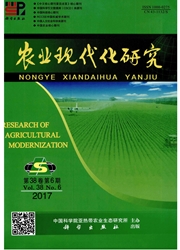

 中文摘要:
中文摘要:
订单农业是促进产业融合、提高农业产业化水平的重要方式,但订单农业的效果却参差不齐。同时,违约率高、稳定性差是中国订单农业实践中的客观现实。利用西南地区茶叶主产县茶叶种植户调查数据,基于心理契约理论,分析订单农业模式的有效性、稳定性,探讨订单农业稳定性的影响因素。结果表明,尽管订单农业参与率低,只有33.79%茶农参加了订单农业,但无论是农民增收还是技术及服务普及方面,订单农业模式都有效,不过就其效果而言,生产合同模式效果优于销售合同模式。农户对高的相对收益、技术及服务可得性、交易公平合理性、满意度、风险共担关系的感知越强烈,越把交易伙伴视为朋友,农户履行协议可能性越高。在是否履约方面,农户是理性的。只有在不损害自己经济利益时,交易伙伴对农户的人情投资才对农户履行协议起促进作用。因此,应鼓励茶叶加工企业通过生产合同模式与农户展开互利合作;茶叶加工企业应通过推广普及现代茶叶生产技术及服务来提高茶业整体经济效益,并与农户分享,还应加强与农户的沟通、交流,争取得到农户的理解,让农户感受到交易的公平性,提高对交易的满意度,把茶叶加工企业当作帮助自己发家致富的朋友。
 英文摘要:
英文摘要:
Contract farming is an important way to promote agricultural integration and industrialization in China. However, the results vary and the high default rate and poor stability prevails in practice. Based on the data of 2 504 tea farmers in the main tea production counties in Southwest China, and applying on the Psychological Contract Theory, this paper conducted an empirical study on the effectiveness and stability of contract farming analyzed its influencing factors. Results show that, although participation rate of contract farming is low, only 33.79%, all contract farming forms can effectively influence farmers' income, technology and service adoption. When comparing the impact levels, production contract form is better than the sales contract form. The stronger perception to high relative income, technology and service availability, transaction fairness, satisfaction level and risk-sharing relationship the farmers have, the stronger friendship the trading partners will make, and the higher possibility the agreement fulfillment will make. In terms of contract performing, tea farmers are rational and only when the contract doesn't hurt their interest, can relationship investment for contract fulfillment effectively work. To promote contract farming development and guarantee the contract to be fulfilled effectively, this paper suggests that tea processing enterprises should strengthen the beneficial cooperation with tea farmers in the production contract form and promote modern tea production technologies and services to improve economic benefit of tea industry. In addition, tea processing enterprises should also improve communication with tea farmers and intensify mutual interest relationship to raise farmers' effective awareness to trade fairness and satisfaction.
 同期刊论文项目
同期刊论文项目
 同项目期刊论文
同项目期刊论文
 期刊信息
期刊信息
